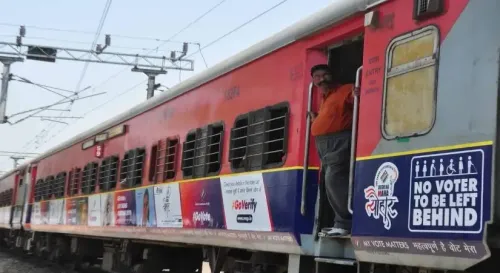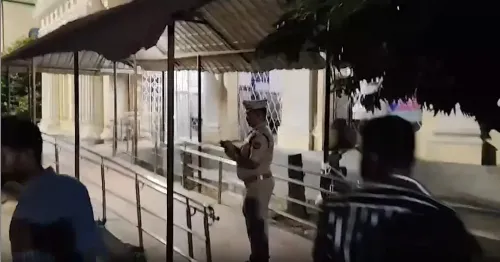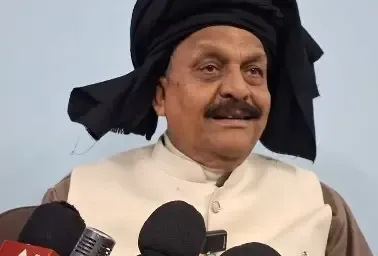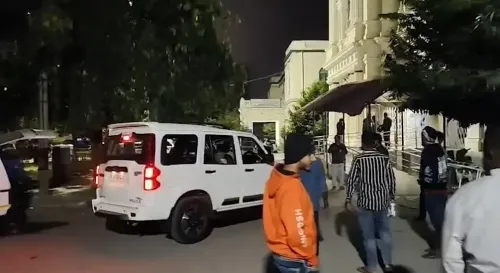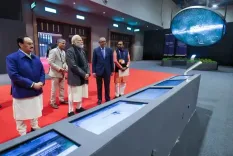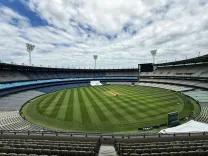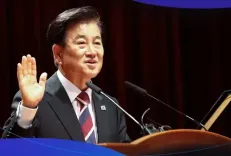Is Tej Pratap carving his own political destiny?
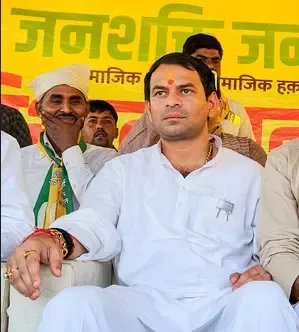
Synopsis
Key Takeaways
- Tej Pratap Yadav is attempting to establish an independent political identity.
- His recent interactions with BJP leaders have sparked speculation about potential alliances.
- He aims to unite regional parties under his JJD banner.
- His performance in the Mahua elections will be crucial for his political future.
- Tej Pratap is leveraging his past electoral successes as a foundation for future campaigns.
New Delhi, Nov 8 (NationPress) Tej Pratap Yadav, the son of Rashtriya Janata Dal (RJD) chief Lalu Prasad Yadav, seems to be forging a distinct political path for himself while striving to remain in the media's limelight as the tension escalates in the ongoing Bihar Assembly election.
On Friday, he sparked speculation about his future political aspirations when he was seen conversing with actor and BJP MP Ravi Kishan at Patna airport. It remains unclear whether their meeting was prearranged or coincidental; however, both individuals exchanged compliments during their interaction with the gathered press.
As the weekend progressed, media discussions revolved around the Yadav heir’s potential political realignment. Just last month, Tej Pratap dismissed the title of “jananayak” (people’s hero) that has been attributed to his younger brother, Tejashwi, who is viewed as Lalu’s successor. He asserted that such a title should only be reserved for notable figures like Ram Manohar Lohia and Karpoori Thakur, emphasizing that while Tejashwi is still a “kid” living in their father’s shadow, he believes he has the support of the people.
However, the 37-year-old has considerable distance to cover and numerous political hurdles to overcome before he can establish himself as a significant, independent leader in Bihar’s competitive political landscape. His public disputes and subsequent removal from the RJD have been widely publicized as a turning point in his political journey. Since then, he has aimed to craft a persona distinct from his more renowned sibling, presenting himself as the leader of a new entity and a coalition-builder, rather than merely a contender for the family legacy.
Once perceived mainly as a figure with familial ties, he now portrays himself as a disenfranchised heir seeking acknowledgment. When questioned about potential post-election scenarios, he remarked, “All options are open,” indicating his readiness to explore alliances if the electoral results are favorable.
Media interpretations of this statement suggest a pragmatic adaptability over ideological consistency, especially given his earlier harsh criticisms of the BJP.
Tej Pratap’s political strategy is anchored on three strategic pillars. First, running from Mahua—the constituency where he first gained recognition—allows him to maintain a connection with his local support base while attempting to expand his reach.
Secondly, by uniting smaller regional parties under his Janshakti Janata Dal (JJD) banner, he aims to forge a new caste coalition, potentially a decisive force in hung assembly scenarios. Thirdly, he adopts a populist and occasionally unconventional approach that combines emotional appeals with provocative messaging to sustain media coverage and grassroots allegiance.
The results of the Mahua Assembly election, with votes being counted on November 14, will be pivotal. He is competing against one of Tejashwi’s close associates, Mukesh Kumar Raushan from the RJD representing the Opposition’s Mahagathbandhan alliance, and Sanjay Kumar Singh from the Lok Janshakti Party (Ram Vilas) who represents the ruling National Democratic Alliance (NDA).
In the 2015 elections, Tej Pratap triumphed over his closest rival from Hindustani Awami Morcha (HAM) by a margin of over 28,000 votes, securing 43.34% of the total valid votes in Mahua. In 2020, he again emerged victorious, this time from the Hasanpur constituency, winning by just over 21,000 votes against the runner-up from Janata Dal (United), with a vote share of 47.27%.
His decision to move from Mahua coincided with rumors that his estranged wife, Aishwarya Rai, might contest for that seat following her father, who was once close to Lalu, Chandrika Rai, switching allegiance from the RJD to JD(U).
Tej Pratap married Aishwarya in 2018 but separated after a contentious marital dispute that angered Chandrika Rai. Thus, his current electoral performance will significantly impact his political future.
Will he manage to break through the glass ceiling typically established by dominant local leaders? The initial step on that journey will depend on the upcoming election results, which remain sealed after Mahua voted in the first phase on November 6.


